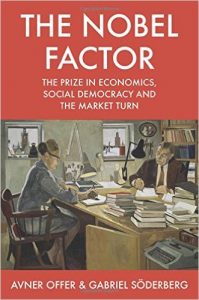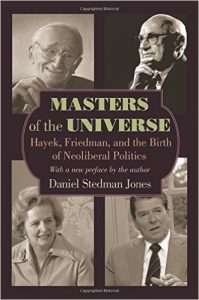I just started reading The Nobel Factor: The prize in economics, social democracy and the market turn by Avner Offer and Gabriel Soderberg. I thought it was going to be more or less a history of the economics Nobel prize – which pedants always want spelled out as the Sveriges Riksbank Prize in Economic Sciences in Memory of Alfred Nobel. Judging from the introduction and 1st chapter, it is more about the role awarding the Nobel prize played in the increasing orientation of economics as a subject toward the free market version emphasising deregulation and individualism. The book points out that “abstract theory peaked in the 1980s” – but the legacy of the deliberate ideological use of rational expectations/real business cycle economics has lingered in the policy and political worlds to this day. The book’s first chapter demolishes these macro models, rooted in ‘microfounded’ general equilibrium models, describing them as ‘surreal’ and ‘lacking respect for reality’. What I’m interested to find out is how the authors argue the Nobel Prize assisted this turn, for many of the recipients were somewhat maverick, working against the tide – think of Herb Simon, or Danny Kahneman, James Tobin and Robert Solow. Anyway, it looks like a good companion to Daniel Stedman-Jones’s account of the Mont Pelerin Society and its acolytes in right wing think tanks, Masters of the Universe.
The Nobel Factor might have caught the moment. Paul Romer’s excellent paper about the state of macroeconomics has made waves. Simon Wren-Lewis has made some interesting points about it. There is an excellent Beatrice Cherrier tweetstorm about rational expectations, well worth looking up. The ESRC is looking to create a macroeconomics network encompassing non-mainstream approaches. Eight years after the crisis, the moment for this debate has arrived.


